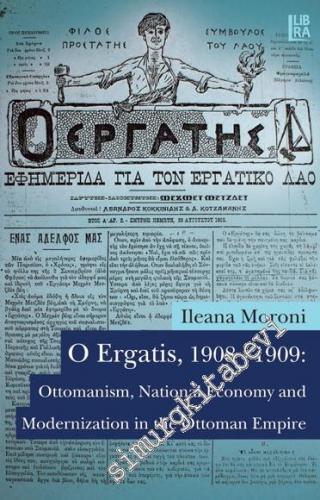#smrgKİTABEVİ O Ergatis, 1908-1909: Ottomanism, National Economy and Modernization in the Ottoman Empire -

Ergatis is a Greek-language newspaper published in Izmir from August 1908 until April 1909. Through the study of this newspaper, this book tries to shed light on certain aspects of the ideological developments that took place in the Ottoman Empire during the first months of the Second Constitutional Period, giving one example of one of the possible handicaps of Ottoman modernization.
It would seem that at least a part of Izmir's Greek-orthodox bourgeoisie - to which the publishers of Ergatis belong - rally around goals that are not very different from the goals pursued by the Young Turks: uniting all Ottomans around a notion of Ottomanism, modernizing the Ottoman Empire and constructing an Ottoman national economy. However, their inability - or unwillingness - to sever their ties with their community's traditional leadership and ideology, places severe constraints upon their modernizing discourse. In order to avoid any social upheaval that would impair their community's standing within the Ottoman power balance, they are obliged, instead of seeking new alliances that would strengthen their modernizing outlook, to espouse an elitist discourse and to draw on traditional elements, thus invalidating their modernizing discourse.
İçindekiler Introduction
I. Ergatis' political programme: Ottomanism and national economy
1. The economic developments of the 19th and early 20th centuries and the position of the Young Turks and the Ottoman Greeks
2. Ottomanism and national economy as expressed by Ergatis
II. Ergatis' failure: its inability to propose a real alternative for the organization of Ottoman society
1. Ergatis' vision of society: corporatism in the service of the nation
2. Ergatis' perception of nation, state and democracy
Conclusion
Bibliography
Ergatis is a Greek-language newspaper published in Izmir from August 1908 until April 1909. Through the study of this newspaper, this book tries to shed light on certain aspects of the ideological developments that took place in the Ottoman Empire during the first months of the Second Constitutional Period, giving one example of one of the possible handicaps of Ottoman modernization.
It would seem that at least a part of Izmir's Greek-orthodox bourgeoisie - to which the publishers of Ergatis belong - rally around goals that are not very different from the goals pursued by the Young Turks: uniting all Ottomans around a notion of Ottomanism, modernizing the Ottoman Empire and constructing an Ottoman national economy. However, their inability - or unwillingness - to sever their ties with their community's traditional leadership and ideology, places severe constraints upon their modernizing discourse. In order to avoid any social upheaval that would impair their community's standing within the Ottoman power balance, they are obliged, instead of seeking new alliances that would strengthen their modernizing outlook, to espouse an elitist discourse and to draw on traditional elements, thus invalidating their modernizing discourse.
İçindekiler Introduction
I. Ergatis' political programme: Ottomanism and national economy
1. The economic developments of the 19th and early 20th centuries and the position of the Young Turks and the Ottoman Greeks
2. Ottomanism and national economy as expressed by Ergatis
II. Ergatis' failure: its inability to propose a real alternative for the organization of Ottoman society
1. Ergatis' vision of society: corporatism in the service of the nation
2. Ergatis' perception of nation, state and democracy
Conclusion
Bibliography




















